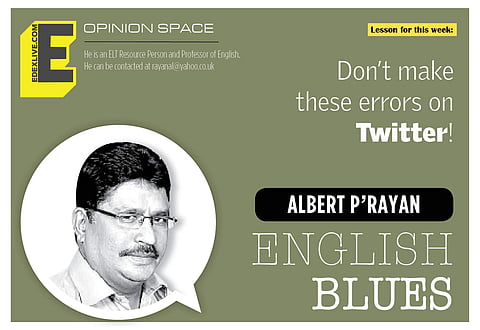

A few weeks ago, I wrote in one of my columns that social media content can be used by teachers of English to teach the language effectively. The authentic language produced by social media users who have different levels of proficiency serves as a good resource. As an English language educator, I have used tweets as authentic materials in my English classes. A few days ago, I looked at the tweets of some well-known people who tweet regularly. I came across errors in some tweets. Let’s look at three different tweets by three different prominent people:
1. Tweet by Rajdeep Sardesai on Feb 12: The great GR Vishwanath turns 72 today. Has any Indian cricketer played the square cut and the late cut better than GRV? The ultimate gentleman cricketer, he along with @VVSLaxman281 were batsmen who used their wrists to perfection. Happy birthday sir!
In the sentence ‘The ultimate gentleman...perfection’, there is subject-verb disagreement. We say that there is ‘subject-verb agreement’ when the subject and verb agree in number. When there is a lack of that agreement, we call it ‘subject-verb disagreement’. When a singular subject is separated from the verb by the phrase ‘along with’, then it must take a singular verb. The sentence will be grammatically correct if it is rephrased as: He, along with @VVSLaxman281, was a batsman who used his wrists to perfection.
2. Tweet by Rahul Gandhi on Feb 12: GOI must explain — 1. Why our forces are withdrawing from dominant positions in Kailash Ranges? 2. Why we are ceding our territory and withdrawing from forwarding base at Finger 4 to Finger 3? 3. Why has China not withdrawn from our territory in Depsang Plains and Gogra Hot Springs?
There is no consistency in the way the questions have been constructed. If all the three questions are part of a statement or sentence, then it must be modified as: GOI must explain 1) why our forces are withdrawing from dominant positions in Kailash Ranges, 2) why we are ceding our territory…, and 3) why China has not withdrawn from our territory… (It is a statement and not a question).
If the three questions are to be treated separately, then it must be rephrased as: GOI must explain — 1. Why are our forces withdrawing from dominant positions in Kailash Ranges? 2. Why are we ceding our territory…? 3. Why has China not withdrawn from our territory…? (These are three different questions)
3. Tweet by Smriti Z Irani on Feb 15: GOI under the leadership of PM @narendramodi Ji is committed to diversify the use of jute & one of the primary examples is the promotion of Jute Geo-Textiles especially in the North East Region. GOI interventions have led to 195 Jute Geo-Textiles rural roads being sanctioned under PMGSY.
In the tweet, the phrase ‘committed to’ is followed by an infinitive. It will sound better if the phrase ‘committed to diversify’ is rephrased as ‘committed to diversifying'. The rule is the phrase ‘committed to’ is either followed by a gerund (‘-ing’ form of the verb) or a noun or noun phrase. Here is an example from the British National Corpus:
They are committed to producing instruments of the highest quality…
